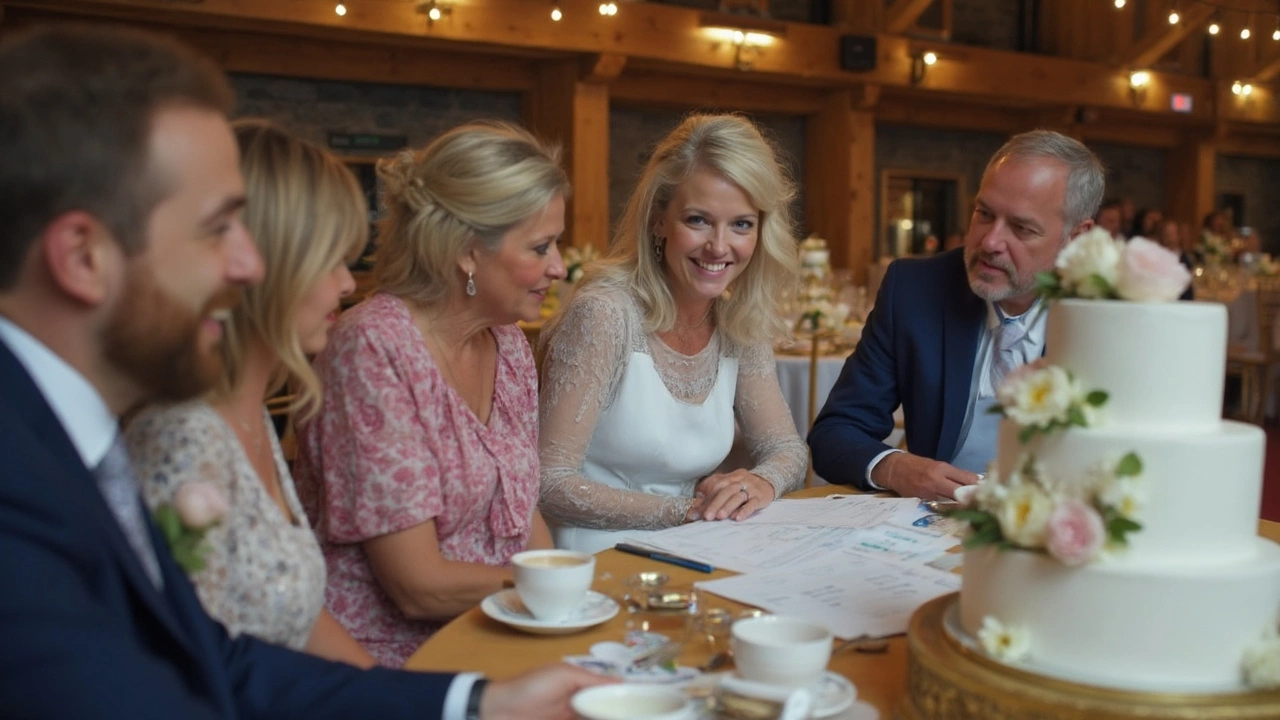Money and weddings. If there's ever a topic that gets people sweating, this is it. Long gone are the days when the bride's family automatically paid for everything while the groom's family just showed up and smiled. Couples in 2024 are shaking things up, with more people paying their own way—or, at least, dividing things up totally differently from what your grandma might remember.
One thing's clear: cake makers see it all. Sometimes the couple pays for their cake themselves. Sometimes a parent insists on covering it as their "special gift." Occasionally, the favorite grandma steps in and makes sure you have the three-tier masterpiece of your dreams. So who really pays for what now? And how do you handle the sometimes awkward, always real conversations about who's footing the various bills?
If you're in that planning mode, it helps to know how real couples are handling it—what works, what causes stress, and where you can save or splurge. Spoiler: almost nobody sticks to the one-size-fits-all etiquette anymore. Let’s break down the numbers, talk about what’s normal in 2024, and get you ready for those crucial money chats (with a few smart cake-saving tips along the way).
- How Wedding Payments Have Changed
- Typical Wedding Budget Breakdown
- Who Handles the Wedding Cake Cost?
- Modern Family Conversations About Money
- Tricky Money Situations (and How to Handle Them)
- Smart Tips for Saving and Splitting
How Wedding Payments Have Changed
If you ask your parents how weddings worked, they’ll probably tell you that the bride’s family paid. Simple, right? Fast forward to 2024, and now it’s a mix of everyone: couples, their parents, and sometimes even grandparents or close friends chip in. What’s changed? A lot.
First off, couples are getting married later. The average age is now around 31, according to a survey by The Knot. That means most people are working and have some savings, so they’re able to pay for more themselves. In fact, for the first time in years, about 40% of all couples say they’re covering the majority (if not all) of their own wedding costs. That’s a huge shift from just a decade ago.
Families still help, but it’s more of a team effort. Parents might split things based on what’s most important to them—maybe the groom’s family pays for the rehearsal dinner, or a parent covers the cake and dessert table, because that’s their thing. There’s really no “official” rule anymore, and couples like it that way, because it gives them more freedom to do their own thing without pressure to stick to old traditions.
Here’s how wedding payments break down for most Americans in 2024:
| Who Pays | Percentage of Total Cost |
|---|---|
| The couple | ~49% |
| Bride’s parents | ~23% |
| Groom’s parents | ~16% |
| Other family/friends | ~12% |
So, if you’re planning right now, you’re not alone if you and your partner are mostly footing the bill—or if you’re divvying things up between several people. It’s all about talking openly, setting the budget up front, and figuring out what actually matters most to you (and your cake-loving relatives).
Typical Wedding Budget Breakdown
If you’re trying to figure out what people actually spend on weddings these days, you’re not alone. One size doesn’t fit all, but national averages can give you a ballpark. According to The Knot’s 2024 Real Weddings Study, the average wedding in the US now costs around $35,000. Some spend less, some spend way more, but this number’s a starting point, not a rule.
Here’s how that breaks out, more or less. Remember, priorities shift—some couples decide cake’s worth the splurge, others may skip the limo.
| Category | Average Cost (2024) |
|---|---|
| Venue (including catering) | $12,500 |
| Photography & Video | $4,500 |
| Reception Band or DJ | $2,500 |
| Wedding Attire | $2,000 |
| Flowers & Decor | $2,500 |
| Wedding cake | $520 |
| Planner/Coordinator | $1,900 |
| Transportation | $850 |
| Invitations | $550 |
| Miscellaneous (favors, gifts, etc.) | $1,680 |
Notice how wedding cakes have their own slice of the budget pie. Most people spend between $350 and $1,000 just on cake, but it really depends on guest count, flavor, and how dreamy (or simple) those designs are. Cake makers now get bookings for everything from single-tier minimalism to towering, themed creations that cost as much as a honeymoon flight.
Planning tip: Make a list of what matters most to you and your partner. Maybe you want an epic dance floor, a killer cocktail hour, or the Instagram cake of dreams. It’s tempting to follow these averages, but your wedding—your rules. Adjust as you go. And don’t be shy about asking vendors exactly what’s included in those numbers, because hidden fees are still very much a thing in 2024.
Who Handles the Wedding Cake Cost?
This one gets awkward fast, right? The old-school rule said the bride’s family ponied up for the whole reception, cake included. But in 2024, there’s no default answer. And honestly, that’s a good thing—more flexibility, less family stress. Here’s how things are really working out for wedding cakes (and why it matters for your budget).
First, let’s talk numbers. The average cost of a wedding cake in the U.S. hit $580 in 2024, according to a RealWeddings survey. But don’t be shocked if you see numbers pushing $1,000 for custom designs in high-demand cities. A basic, single-tier cake for a small guest list? You might spend less than $200. Cutting corners or DIY can drop costs even more.
| Type of Cake | Average Cost (USD, 2024) |
|---|---|
| Single-tier, basic design | $150 - $250 |
| Three-tier, classic | $400 - $700 |
| Custom/luxury cake | $900 - $1,200 |
So who steps in and pays for the cake these days? You’ve got a few real options:
- wedding costs often get split up, and the cake is just one slice of the whole pie.
- Couples paying alone: Over half of couples in 2024 are paying for their own cakes, especially if they’re also covering other big expenses independently.
- Parents helping out: Sometimes parents offer to pay for the cake specifically, either as part of their overall wedding contribution or because they want to treat everyone to something special.
- Joint effort: Families might split the cost, especially when both sides want to pitch in for the big day. Easier if everyone’s clear on the budget ahead of time.
- Creative alternatives: Friends or relatives who bake may offer to make the cake as a gift, or couples may hit up bakeries for cupcakes or sheet cakes instead—way cheaper, still delicious.
The main thing? There’s no rule. Most cake makers are used to requests for split payments or multiple contacts on an invoice. Just make sure you’re clear (and honest) with whoever’s actually footing the bill, and don’t assume anyone will just "take care of it" unless you hear a definite yes.
Looking to save? Couples are going for smaller display cakes with extra sheet cake in the back for serving. No one on the dance floor will know the difference, but your wallet will.

Modern Family Conversations About Money
If you’re talking to your family about wedding money in 2024, you’re not alone in feeling a little awkward. But here’s a secret: more couples are getting blunt about dollars than ever. According to data from The Knot’s 2024 wedding report, over 67% of engaged couples say both sets of parents chip in—but almost half of couples still cover a big chunk themselves. Nobody’s just guessing; serious money talks are officially part of the planning routine.
People aren’t hiding their budgets anymore, either. It’s common for parents to ask for a realistic number up front. Forget the old rules—families now pull out spreadsheets, share Google Docs, and sometimes even send group texts about who pays for the cake (yep, that happens). These days, most families care more about fairness and transparency than sticking to tradition.
| Payer | Average % Paid |
|---|---|
| Couple | 44% |
| Bride’s Family | 30% |
| Groom’s Family | 21% |
| Other (friends, other relatives) | 5% |
So how do you tackle the talk? Here’s what works in real life:
- Schedule a time when everyone’s free (no springing the money talk over dinner or while someone’s trying to watch the game).
- Share your wedding costs early, including estimated big-ticket items (think: cake, food, venue). Transparency matters.
- Ask what each side might be comfortable spending, or if they want to cover specific things (like the cake or DJ).
- Use real numbers. Vague guesses make it messier later on.
- Be ready to compromise. Maybe your dream cake is pricy—could you go smaller or choose a simpler design to make the numbers work?
Families aren’t always on the same page, and that’s okay. If someone offers to pay for something special, say thank you and let them enjoy their moment. And if you’re splitting the bill with your partner’s fam, keep everything in writing so there’s no stress down the road.
Tricky Money Situations (and How to Handle Them)
No matter how organized you are, talking about wedding cash can get awkward fast. Maybe a parent offers to help, but wants control over major decisions. Or your future in-laws say they’ll pick up the cake tab, then change their minds when they see the price. These money talks happen to almost every couple.
Here’s a real fact: according to a 2024 national survey by Zola, 61% of couples said they had at least one argument about wedding costs—and cake isn’t even the most common sticking point. Where things mostly get tense is figuring out who pays for each part and what happens if someone can’t (or won’t) follow through.
| Common Money Headaches | Percentage of Couples Experiencing |
|---|---|
| Unexpected Family Demands (like extra guests) | 45% |
| People Backing Out on Offers | 30% |
| Disagreements Over Vendor Choices | 38% |
| Paying for Traditions No One Cares About | 26% |
Now, what do you do when this stuff pops up? It helps to set a few ground rules early. Here are some practical steps:
- Write down who’s paying for each part before booking anything. That way, everyone’s in the loop.
- If someone offers to pay for something, clarify the budget. For example: "We’d love it if you covered the cake—were you thinking of a certain price?"
- Have honest, judgment-free talks if plans change. People’s money situations shift. If someone has to back out, find out early so you’re not scrambling at the last minute.
- Say no to strings you aren’t okay with. If someone is only paying if they can control the guest list or location, weigh if it’s worth it.
- Be real with yourself and your partner about what traditions or things actually matter and drop the rest. If no one cares about a traditional favor or giant cake topper, save the money and headaches.
When in doubt, take a short pause instead of firing off a frustrated text. Few money situations are true emergencies—a cool head now keeps the actual day way less stressful.
Smart Tips for Saving and Splitting
If you’re stressing about wedding costs, you’re not alone. Most couples look for tricks to save money, avoid big surprises, and keep everyone involved happy—or at least not fighting. Here’s how people are making it all work in 2024.
First, talk openly with anyone who’s helping pay. Hiding your real numbers or guessing what others want to spend almost always ends with confusion or hurt feelings. Grab a spreadsheet or budgeting app and share costs up front. Experts at The Knot say the average wedding cost $35,000 in 2024. Being clear about your wedding costs from the start helps you divide things up without drama.
- Split up costs by category. For example, one side handles the venue, another pays for catering, and the couple covers the wedding cake.
- Consider a percentage split. If parents on both sides want to help, you might go 40/40/20—each family handles 40%, and the couple covers 20% themselves.
- Make a "must-have" vs. "nice-to-have" list. Put more money into what matters (food, the cake everyone talks about), and skip extras nobody remembers (like, say, customized cocktail napkins).
- Ask vendors about payment plans or off-peak discounts. Wedding cake makers often give discounts for weekday weddings or smaller cakes. Be honest about your budget—they often have ideas you haven’t thought of.
Let’s get into the numbers. Here’s how people split costs and some national averages:
| Expense | Average Cost (2024, USD) | Who Pays? (Most Common) |
|---|---|---|
| Venue | $12,000 | Bride's family or split |
| Catering | $8,500 | Mixed/couple/parents |
| Wedding Cake | $600 | Couple or gift from parents/grandparents |
| Photography | $3,000 | Mixed or couple |
| DJ/Band | $2,500 | Couple or split |
Brainstorm with your cake maker for creative ways to cut costs. Couples sometimes order a smaller, "Instagram cake" for photos and a sheet cake that’s sliced and served from the kitchen—much cheaper, but nobody misses out on dessert. Others do cupcake towers or serve local bakery favorites instead of a classic tiered cake.
Bottom line? There’s no single way to split wedding costs. Just be honest, work as a team, and remember: everyone will remember if the cake tastes amazing—not how much you spent on monogrammed forks.

